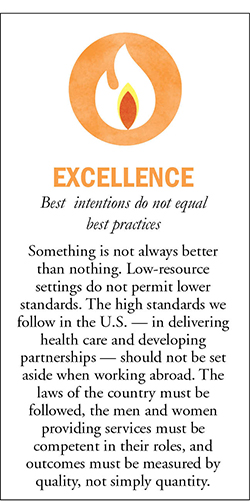BY BRUCE COMPTON

Excellence in global health activities is essential and something that we can be attending to even as our world continues to isolate against the coronavirus.
For the fifth anniversary of the creation of CHA's Guiding Principles for Conducting Global Health Activities, we've been exploring how they've been put into practical use in a series of Health Progress columns. Here, Sr. Mary Jo McGinley, RSM, reflects on the principle of Excellence in the global health activities she has overseen first at Catholic Health East and now at Trinity Health. Her memories and commitment to Excellence dovetail many of the essays we've published in a new collection that is COVID-19 related, but her comments here are particularly apt for our celebration of the Guiding Principle's fifth anniversary. Like Sr. McGinley, many of our authors in Renewing Relationship: Essays as We Evolve and Emerge from Pandemic consider past and present, opportunities and challenges.
Have you participated in a medical mission trip or immersion experience, donated to an international disaster response, or are responsible for colleagues who participate in such activities? If so, please take time to consider your involvement in relation to Sr. McGinley's experience and CHA's Guiding Principles. I hope that you will also take a few minutes to read the anniversary edition and the essay collection at www.chausa.org/guidingprinciples.
_______________
Excellence
SR. MARY JO McGINLEY, RSM, MS Ed, MPH
On October 22, 2010, less than a year after the horrific earthquake that claimed more than 200,000 Haitian lives, Haiti's National Public Health Laboratory announced a cholera epidemic in the Artibonite Valley in northwest Haiti. Since we were scheduled to take a medical team to that region in less than three weeks, this news caused great concern for our organization, Global Health Ministry. With over 20 years of experience conducting medical missions, Global Health Ministry reached deep into those years of experience and its never-ending quest for doing the right thing the right way. Keeping tabs on the bulletins coming from Haiti and the Centers for Disease Control and Prevention, we first reached out to our in-country partner to ask if they still wanted us to come or would we add to their burden. Once they affirmed the need for us to come, we contacted each team member, directing them to confer with their loved ones and decide if they were in or wanted out. All 15 team members said yes, and so we moved to a rapid review with our in-country partner, CDC input and other sources to determine what we needed to add to our supplies and personal preparations. The Sunday before Thanksgiving we all came home, very tired but quite healthy, after our most difficult medical mission. That is still true more than 10 years and over 50 missions later.
Looking back at the 2010 mission and considering the Guiding Principles, it is obvious that all six principles were active then and must be active in every medical or surgical mission in the following ways:
 Prudence — Good planning precedes every mission, and if an emergency overtakes the norm, initiate rapid and prudent research and planning.
Prudence — Good planning precedes every mission, and if an emergency overtakes the norm, initiate rapid and prudent research and planning.
Authenticity — Your in-country partner must know the community and be able connect with needed external resources in an emergency. In the case of the 2010 cholera epidemic that occurred 10 months after the earthquake, in-country connections with the United Nations assured ample supplies of IV fluid, and Catholic Relief Services responded rapidly with needed support.
Honesty — International service groups earn the trust of their constituents by not distorting the truth.
Patience — In an emergency, you must focus on one patient at a time. In developing long-term relationships and helping your in-country partners move toward self-sustainability, "poca a poca" (little by little) brings about effective and lasting change.
Humility —taking the time, even in an emergency, for the team to reflect on their feelings and learnings of the day enriches the experience and helps make tomorrow or the next mission better.
Excellence — We are challenged and required to establish and execute high standards in all we do.
Striving for Excellence must direct all persons who endeavor to conduct short-term international medical missions. This goal inspires our Global Health Ministry medical and surgical teams that currently serve with in-country partners in Peru, Haiti, Jamaica and Guatemala. During a recent Global Health Ministry medical mission, a photographer and reporter from Vanity Fair Italy approached our team to inquire if they were doing "voluntourism." Our team leader viewed this as a personal insult and quickly and graciously ushered them from the clinic site. Voluntourism refers to missions that focus primarily on the volunteers themselves and what they get from their half service/half vacation experience. Excellent short-term medical missions focus on and empower local leaders, as well as the local recipients, to move toward self-sustainability. Short-term mission volunteers who recognize this and serve with humility promote the principle of Excellence.
As an organization that conducts short-term international medical missions as its primary operational goal, Global Health Ministry strives for Excellence with every mission and every participant. This principle, along with the mandate "Do No Harm," animate our staff to prepare, implement and evaluate each mission with all the Guiding Principles in mind. We often use the principles for our team orientations and evening reflections during the mission.
Global Health Ministry, a member of Trinity Health, began in 1989 in response to an invitation from Sisters of Mercy from Philadelphia who were ministering in the Piura region of northwest Peru. That initial request underpins Global Health Ministry's basic philosophy, that we serve "at the invitation and direction of our in-country partners, assisting them in their goal to build sustainable, healthy communities." People often ask, "How do you pick where your teams go?," and we respond, "they picked us." We constantly remind ourselves and our U.S. volunteers that it is our in-country partners' program and that we are there to serve side-by-side with them. We have shared the Guiding Principles with our in-country partners, our board and individuals and organizations that ask for our advice as they endeavor to initiate international health programs. The Principles possess dynamic possibilities.
Successful missions start with careful screening and selection of qualified team members and move forward with well-prepared and presented orientation experiences months before departure. Screening applicants must include emphasis on organizational values that lay out volunteer expectations, and clearly define goals as well as quality parameters. All team members must be fully qualified for their assigned roles, and no one should be expected or allowed to practice beyond their professional scope. These values are shared by many international Ministries of Health that require pre-registering team members and submitting the academic credentials as well as current licenses of all clinicians on the team. One way we try to screen out persons looking to be "saviors" is to ask potential volunteers to identify their motives both in writing their applications and in the personal interviews that take place during the application process. If they say, "... sounds like a nice place to visit … or … I want to go and preach the Gospel …" we encourage them to pursue those goals on their own. The words written and the tone heard in answers provide great insight when you read or listen with your maximum intuitive skills. While far from perfect, this process helps us develop teams that come together as learners, not doers.
Unfortunately, we have encountered "do-gooder" groups who ignore the quality standards of their host government and seem to believe they know how to do it all. A clinician who cavalierly thinks it is OK to act beyond their scope of practice should not be tolerated or supported.
With over 30 years of experience, Global Health Ministry has witnessed significant improvements in the health status and health infrastructure at each location where we serve. We know this progress gives testimony to years of day-in and day-out hard work on the part of our in-country partners and not solely our appearance for a short-term mission once or twice a year. The ministry communicates with its in-country partners throughout the year, often responding to various requests that assist the partner in their community's well-being. The adage "teach a person to fish …" works both ways. That means that sharing learnings with our international partners, along with fostering health education, underpins a great deal of the progress we see.
In addition to providing practical information, orientations should encourage participants to use the experience to broaden their worldview by learning about the culture as well as the daily challenges encountered by those they volunteer with and those they serve. Capitalizing on the wealth of veteran volunteers as well as paying attention to original questions from new volunteers enriches the orientation for everyone.
Once on site, time is scheduled for an opening meeting that recalls the goals spelled out during orientation. Challenging team members to use the mission experience to meet and learn from those with whom and whom we are serving helps foster the transformation of each participant. Taking time for frequent team reflections nurtures this even further.
In a recent Health Progress article, Bruce Compton, CHA's senior director of global health, identified the "…unequal power dynamics of racism and classism..." in the global health field. We need to look in the mirror and see what our international partners and our international patients see. Do we appear to question or even belittle the clinical skills of local providers and facilities, or do we recognize the hard work that has helped them to get this far? Do we come in as the "experts," or are we willing to accept and promote leadership by our in-country partners? On a more mundane level, do we separate ourselves from our hosts and patients by wearing hats or T-shirts with our organization's logo? Are we gracious guests if our vegan diet means we reject the food offered at the table to which we have been invited? Inviting our U.S. volunteers and as many of their supporters to recognize and appreciate not just the culture, but also the inherent strength and goodness of those we serve helps to expand one's global view.
What you bring in and what you leave serve as additional measures of Excellence for all international medical and surgical missions. Most countries have strict standards regarding expiration dates of medicines and medical supplies, and these standards need to be respected and strictly followed. In addition, before bringing equipment and other supplies, good stewardship means we first ask our in-country partner if the item can be used. All items should be clean, in good working order, and not quickly become obsolete because replacement parts or needed supplies are not easily acquired.
Great care should be taken to identify qualified local professionals responsible for distributing surplus medications and supplies. In addition, the medical team is responsible to do everything possible to assure that each patient who needs additional treatment after the team leaves will receive that treatment. This often requires leaving the financial resources needed in the hands of your trusted in-country partner and establishing a manageable feedback mechanism for reporting follow-up care.
No longer being needed should be our ultimate goal. The Guiding Principles encourage us to be honest in our relationships. Staying vigilant and avoiding being too comfortable will alert you to know when it is time to amicably part ways with a partner, hopefully in a spirit of mutual gratitude. Honestly admitting that we are no longer needed gifts us with a reality to be celebrated. Global Health Ministry has faced and acted on this reality more than once.
SR. MARY JO McGINLEY, a member of the Sisters of Mercy of the Americas, is the executive director for Global Health Ministry with Trinity Health.